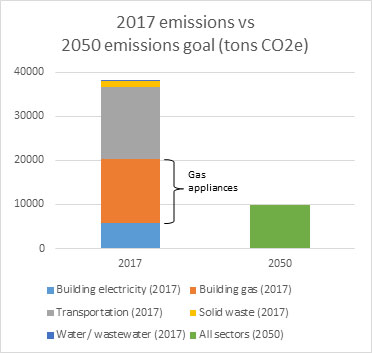Reach Codes
REACH CODE REQUIREMENTS
On October 17, 2022, the Piedmont City Council adopted a new Reach Code Ordinance to be effective along with the 2022 California Building Code on January 1, 2023. The Reach Code requires:
- Existing Building Alterations or Additions
- Projects that include an entirely new level or expand the total roof area by 30% or more, must install solar panels on the roof.
- An application for a kitchen or laundry area renovation must include electrical outlets for future appliance installations.
- A renovation project that costs $30,000 or more must include an energy efficient insulation or heating system electrification improvement to include in the renovation. A renovation project that costs $115,000 or more must include two energy efficient insulation or heating system electrification improvements to include in the renovation.
- Electrical Panel Upgrades
- An application for an electrical panel upgrade must include capacity in the panel to accommodate future electrification of all appliances in the residence.
WHAT IS A REACH CODE?
A reach code is an ordinance adopted by a local government that requires something in addition to the requirements of the state's building code. Reach codes can address all types of buildings: new buildings, existing buildings, single family buildings, multi-family dwellings, commercial buildings, and industrial buildings. Reach codes that are related to energy efficiency must be proven to be cost-effective. To be cost effective, the money saved from the reduced energy costs needs to be enough to cover the initial cost within a reasonable period of time. Reach codes must go through a public process for approval.
WHY ADOPT A REACH CODE?
Reach codes are tools local governments can use to help reach various policy goals such as reducing greenhouse gas emissions, meeting Climate Action Plan goals, saving energy and money over time, and increasing building resilience. Decades of investment in renewable energy combined with technological improvements in efficient electric appliances has enabled significant advancements in the area of building and vehicle electrification. Compared to fossil fuels, the economic, environmental, and societal benefits of electrification are substantial. Ultimately, by powering buildings and vehicles in Piedmont with clean electricity, our community will be on a path toward achieving our greenhouse gas reduction and sustainability goals. Piedmont’s Climate Action Plan 2.0 sets an ambitious goal of reducing in-territory greenhouse gas emissions 80% between 2005 and 2050. The Piedmont community will not meet its 2050 target unless natural gas appliances are phased out of use (see below).

WHAT FINANCIAL REBATES AND INCENTIVES ARE AVAILABLE?
- Green House Call offers you free energy saving kits delivered to your home.
- PACE funding is a way for homeowners to borrow money for energy projects and spread the cost over a long period of time.
- PG&E offers rebates for products such as thermostats, electric heat pump water heaters, and more.
- The REEL program is a way to finance energy improvements in California. Up to 30% of financing can be used on non-energy improvements.
BACKGROUND INFORMATION ON PIEDMONT'S REACH CODE INITIATIVE
The California Building Standards Code (California Code of Regulations, Title 24) sets statewide building code standards. Title 24, Part 6, also known as the California Building Energy Efficiency Standards or "Energy Code", contains mandatory measures for residential buildings (single family and multi-family) and non-residential buildings and sets an energy budget for each type of building. Title 24, Part 11, also known as the California Green Building Standards Code, contains mandatory requirements for all types of buildings in areas such as green materials and recycling, water efficiency, and electric vehicle charging.
During the February 1, 2021 regular meeting, Piedmont’s City Council adopted the City's first Reach Codes that required electrification and energy efficiency measures for new construction and existing residential building renovations. The Reach Codes are designed to meet the City’s climate action goals by reducing greenhouse gas emissions and natural gas usage in residential buildings. Natural gas use in residential buildings consistently comprises nearly half of Piedmont's in-territory greenhouse gas emissions. The Reach Code (Ordinance 750 N.S.) went into effect on June 1, 2021.
Title 24 receives updates every three years to incorporate the latest changes in construction and technology. The latest update (2019 Energy Code) went into effect on January 1, 2020 and will expire on December 31, 2022. Starting January 1, 2023, the 2022 Energy Code will go into effect. The 2022 Energy Code encourages efficient electric heat pumps, establishes electric-ready requirements for new homes, expands solar photovoltaic and battery storage standards, strengthens ventilation standards, and more.
When the Energy Code is updated, all cities and counties need to adopt the new Code and any local amendments to the Code. Accordingly, in order to continue Piedmont's Reach Code requirements, a new code had to be adopted in 2022. During their October 17th meeting, the City Council adopted Ordinance 766 N.S., establishing Reach Codes that will be in effect from January 1, 2023 until December 31, 2025.
RELEVANT RESOURCES
2022 Reach Code Initiative
2021 Reach Code Initiative
If you have questions or comments regarding Piedmont's Reach Codes, please contact us at [email protected].